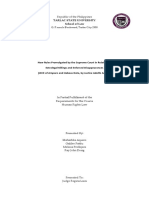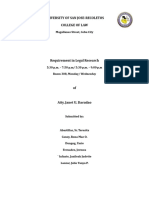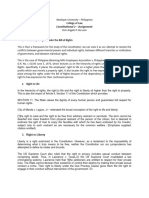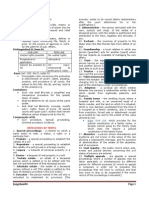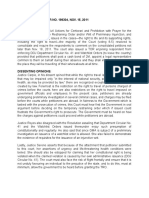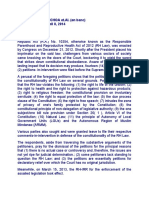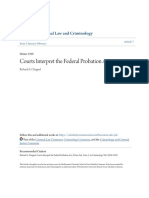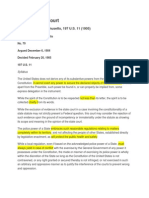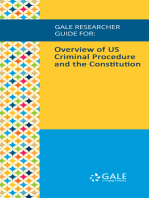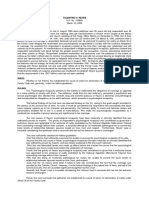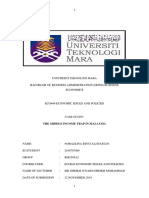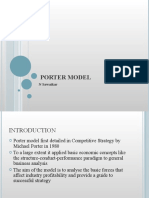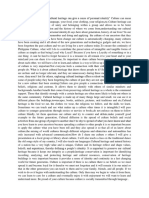Leo Echegaray Was A Sick Man Who Raped His Own Daughter Rodessa Echegaray. The Secretary of Justice at The Time of This Case Was Serafin Cuevas
Leo Echegaray Was A Sick Man Who Raped His Own Daughter Rodessa Echegaray. The Secretary of Justice at The Time of This Case Was Serafin Cuevas
Uploaded by
MonicaFrancesSalvadorCopyright:
Available Formats
Leo Echegaray Was A Sick Man Who Raped His Own Daughter Rodessa Echegaray. The Secretary of Justice at The Time of This Case Was Serafin Cuevas
Leo Echegaray Was A Sick Man Who Raped His Own Daughter Rodessa Echegaray. The Secretary of Justice at The Time of This Case Was Serafin Cuevas
Uploaded by
MonicaFrancesSalvadorOriginal Description:
Original Title
Copyright
Available Formats
Share this document
Did you find this document useful?
Is this content inappropriate?
Copyright:
Available Formats
Leo Echegaray Was A Sick Man Who Raped His Own Daughter Rodessa Echegaray. The Secretary of Justice at The Time of This Case Was Serafin Cuevas
Leo Echegaray Was A Sick Man Who Raped His Own Daughter Rodessa Echegaray. The Secretary of Justice at The Time of This Case Was Serafin Cuevas
Uploaded by
MonicaFrancesSalvadorCopyright:
Available Formats
Echegaray v.
Secretary of Justice
Leo Echegaray was a sick man who raped his own daughter Rodessa Echegaray. The Secretary
of Justice at the time of this case was Serafin Cuevas.
Facts: On 4 January 1999, the Supreme Court issued a Temporary Restraining Order staying the
execution of petitioner Leo Echegaray scheduled on that same day. The public respondent Justice
Secretary assailed the issuance of the TRO arguing that the action of the Supreme Court not only
violated the rule on finality of judgment but also encroached on the power of the executive to
onstitutional Law 317
vb) By Resolution in A.M. No. 08-1-16-SC, the Supreme Court promulgated the Rule on the
Writ of Habeas Data, effective February 2, 2008. Section 1 thereof provides: “The writ of habeas
data is a remedy available to any person whose right to privacy in life, liberty or security is
violated or threatened with violation by an unlawful act or omission of a public official or
employee, or of a private individual or entity engaged in the gathering, collecting or storing of
data or information regarding the person, family, honor and correspondence of the aggrieved
party. ”
vi) Congress cannot amend the Rules of Court. In Echegaray v. Secretary of Justice, G.R. No.
132601, January 19, 1999, the Supreme Court declared: “But most importantly, the 1987
Constitution took away the power of Congress to repeal, alter or supplement rules concerning
pleading, practice and procedure. In fine, the power to promulgate rules of pleading, practice and
procedure is no longer shared by this Court with Congress, more so with the Executive.”
vii) Rules of procedure of special courts and quasi-judicial bodies shall remain effective unless
disapproved by judgment and its jurisdiction to amend, modify or alter the same. The former
continues even after the judgment has become final for the purpose of enforcement of judgment;
the latter terminates when the judgment becomes final. For after the judgment has become final
facts and circumstances may transpire which can render the execution unjust or impossible.
The power to control the execution of its decision is an essential aspect of jurisdiction. It cannot
be the subject of substantial subtraction for our Constitution vests the entirety of judicial power
in one Supreme Court and in such lower courts as may be established by law.
The suspension of such a death sentence is undisputably an exercise of judicial power. It is not a
usurpation of the presidential power of reprieve though its effect is the same — the temporary
suspension of the execution of the death convict. In the same vein, it cannot be denied that
Congress can at any time amend RA 7659 (Death Penalty Law) by reducing the penalty of death
to life imprisonment. The effect of such an amendment is like that of commutation of sentence.
But by no stretch of the imagination can the exercise by Congress of its plenary power to amend
laws be considered as a violation of the power of the President to commute final sentences of
conviction. The powers of the Executive, the Legislative and the Judiciary to save the life of a
death convict do not exclude each other for the simple reason that there is no higher right than
the right to life. Indeed, in various States in the United States, laws have even been enacted
expressly granting courts the power to suspend execution of convicts and their constitutionality
has been upheld over arguments that they infringe upon the power of the President to grant
reprieves. For the public respondents therefore to contend that only the Executive can protect the
right to life of an accused after his final conviction is to violate the principle of co-equal and
coordinate powers of the three branches of our government.
(b) "Child abuse" refers to the maltreatment, whether habitual or not, of
the child which includes any of the following:
(1) Psychological and physical abuse, neglect, cruelty, sexual abuse
and emotional maltreatment;
(2) Any act by deeds or words which debases, degrades or demeans
the intrinsic worth and dignity of a child as a human being;
(3) Unreasonable deprivation of his basic needs for survival, such
as food and shelter; or
(4) Failure to immediately give medical treatment to an injured
child resulting in serious impairment of his growth and
development or in his permanent incapacity or death.
(c) "Circumstances which gravely threaten or endanger the survival and
normal development of children" include, but are not limited to, the
following;
Background of the Case:
1998 Decision
FACTS:
On June 25, 1996, petitioner was convicted for the rape of his common law spouse’s ten year old daughter and was
sentenced to death penalty. He filed a Motion for Reconsideration and Supplemental Motion for Reconsideration
raising for the first time the constitutionality of RA 7659 “ The Death Penalty Law”, and the imposition of death
penalty for the crime of rape. The motions were denied with the court finding no reason to declare it
unconstitutional and pronouncing Congress compliant with the requirements for its imposition.
Act 8177 was passed amending Art. 8 of the RPC as amended by Sec. 24 of RA 7659. The mode of execution was
changed from electrocution to lethal injection. The Secretary of Justice promulgated the rules and regulations to
implement R.A 8177 and directed the Director of Bureau of Corrections to prepare the Lethal Injection Manual.
Petitioner filed a petition for prohibition, injunction and TRO to enjoin the Secretary of Justice and Director of
Bureau of Prisons from carrying out the execution, contending that RA 8177 and its implementing rules are
unconstitutional and void. The Executive Judge of the RTC of Quezon City and Presiding Judge of RTC Branch 104
were later impleaded to enjoin them from setting a date of execution.
On March 3, 1998 , the court required respondents to comment and mandated the parties to mantain status quo .
Petitioner filed a very urgent motion to clarify status quo and to request for TRO until resolution of the petition.
The Solicitor General filed a comment on the petition dismissing the claim that the RA in question is
unconstitutional and providing arguments in support of his contention. CHR filed a motion for Leave of Court to
Intervene and appear as Amicus Curiae alleging that the death penalty is cruel and degrading citing applicable
provisions and statistics showing how other countries have abolished the death penalty and how some have become
abolitionists in practice . Petitioner filed a reply stating that lethal injection is cruel, degrading , inhuman and
violative of the International Covenant on Civil and Political Rights.
ISSUE : Whether or not R.A. 8117 and its implementing rules are violative of the unconstitutional proscription
against cruel, degrading and inhuman punishment, violative of international treaty and obligations , discriminatory
and an undue delegation of legislative powers.
RULING:
I. LETHAL INJECTION, NOT CRUEL, DEGRADING OR INHUMAN PUNISHMENT UNDER
SECTION 19, ARTICLE III OF THE 1987 CONSTITUTION.
You might also like
- Revised Penal Code - Book 1 - Reyes PDFDocument941 pagesRevised Penal Code - Book 1 - Reyes PDFHezekiah Joshua90% (10)
- Sample Motion to Vacate, Motion to Dismiss, Affidavits, Notice of Objection, and Notice of Intent to File ClaimFrom EverandSample Motion to Vacate, Motion to Dismiss, Affidavits, Notice of Objection, and Notice of Intent to File ClaimRating: 5 out of 5 stars5/5 (23)
- Institutional Correction Easy - QuestionsDocument16 pagesInstitutional Correction Easy - QuestionsKhael Bureros89% (9)
- Echegaray V Secretary of JusticeDocument3 pagesEchegaray V Secretary of JusticeAndrea Juarez100% (4)
- Situation ReportDocument3 pagesSituation ReportGalo Delgado83% (6)
- Mexican MuralismDocument6 pagesMexican Muralismrsbasu50% (2)
- Reyes RPC Book 1Document941 pagesReyes RPC Book 1Kaye Mendoza100% (2)
- Art. III, Sec. 2 & 3 Case Digest CompilationDocument11 pagesArt. III, Sec. 2 & 3 Case Digest CompilationClaire Culminas86% (14)
- Leo Echegaray Was A Sick Man Who Raped His Own Daughter Rodessa Echegaray. The Secretary of Justice at The Time of This Case Was Serafin CuevasDocument3 pagesLeo Echegaray Was A Sick Man Who Raped His Own Daughter Rodessa Echegaray. The Secretary of Justice at The Time of This Case Was Serafin CuevasMonicaFrancesSalvadorNo ratings yet
- Leo Echegaray Was A Sick Man Who Raped His Own Daughter Rodessa Echegaray. The Secretary of Justice at The Time of This Case Was Serafin CuevasDocument1 pageLeo Echegaray Was A Sick Man Who Raped His Own Daughter Rodessa Echegaray. The Secretary of Justice at The Time of This Case Was Serafin CuevasMonicaFrancesSalvadorNo ratings yet
- Ex Post Facto LawDocument18 pagesEx Post Facto LawJomar Ababa DenilaNo ratings yet
- JurisdictionDocument27 pagesJurisdictionJOHN100% (2)
- Module A Case 1 To 38 FinalDocument42 pagesModule A Case 1 To 38 FinalIrish B. CayabasNo ratings yet
- Tarlac State University School of Law: Republic of The PhilippinesDocument8 pagesTarlac State University School of Law: Republic of The PhilippinesRay John Arandia DorigNo ratings yet
- University of San Jose-Recoletos College of Law: Magallanes Street, Cebu CityDocument25 pagesUniversity of San Jose-Recoletos College of Law: Magallanes Street, Cebu CityJanileahJudetteInfanteNo ratings yet
- Ass Consti Feb 13Document3 pagesAss Consti Feb 13zionangelodeleonNo ratings yet
- Specpro (Mid)Document13 pagesSpecpro (Mid)chantartNo ratings yet
- Cooley, in His Very Valuable Work On Constitutional Limitations, SaidDocument4 pagesCooley, in His Very Valuable Work On Constitutional Limitations, SaidJessica VargasNo ratings yet
- Echegaray V Secretary of Justice (1998)Document2 pagesEchegaray V Secretary of Justice (1998)Erika PinedaNo ratings yet
- Political Law Review 1Document30 pagesPolitical Law Review 1Anne VallaritNo ratings yet
- QuizDocument6 pagesQuizryusakigottoNo ratings yet
- Imbong Vs Ochoa (Case Digest)Document7 pagesImbong Vs Ochoa (Case Digest)FeBrluado83% (6)
- Consti DigestDocument7 pagesConsti DigestJohn Lester LantinNo ratings yet
- Echegaray V SOJDocument2 pagesEchegaray V SOJBeeya EchauzNo ratings yet
- Eileen Mo 2 Recuse Judge Conrad Rev3Document5 pagesEileen Mo 2 Recuse Judge Conrad Rev3luca108No ratings yet
- QuizDocument6 pagesQuizryusakigottoNo ratings yet
- IMBONG Vs OCHOADocument3 pagesIMBONG Vs OCHOAJassen MaliniasNo ratings yet
- NOTES IN CRIMINAL EVIDENCE Part 1Document54 pagesNOTES IN CRIMINAL EVIDENCE Part 1Ejay TabangcuraNo ratings yet
- Civil Law Review On Persons and Family LawDocument117 pagesCivil Law Review On Persons and Family LawdreaNo ratings yet
- NOTES IN CRIMINAL EVIDENCE Part 1 and 2Document67 pagesNOTES IN CRIMINAL EVIDENCE Part 1 and 2Keanne ZingapanNo ratings yet
- Semmy Lasco Kavinga V The People Appeal No 51 - 2018 (21 August 201Document8 pagesSemmy Lasco Kavinga V The People Appeal No 51 - 2018 (21 August 201Dalitso MzyeceNo ratings yet
- Jacobson-v.-Massachusetts - 197-U.S.-11-1905Document18 pagesJacobson-v.-Massachusetts - 197-U.S.-11-1905Mikey Cupin100% (1)
- Constitutional Law 2 ReviewerDocument31 pagesConstitutional Law 2 Reviewer88isl100% (2)
- Courts Interpret The Federal Probation ActDocument11 pagesCourts Interpret The Federal Probation ActBHEVERLYN MAE ICOYNo ratings yet
- Inherent PowersDocument8 pagesInherent PowersAgatha GranadoNo ratings yet
- Reyes RPC Book 1Document943 pagesReyes RPC Book 1Shan Jerome Lapuz Samoy100% (1)
- Juris Assignment Deliveraance - Docx FinaleDocument9 pagesJuris Assignment Deliveraance - Docx FinaledeliverancesmoyoNo ratings yet
- Imbong V Ochoa DigestDocument4 pagesImbong V Ochoa DigestCamille TapecNo ratings yet
- Balag Vs Senate of The PhilippinesDocument5 pagesBalag Vs Senate of The PhilippinesKael MarmaladeNo ratings yet
- Case 86Document3 pagesCase 86mindeeNo ratings yet
- Buck V Bell DigestDocument4 pagesBuck V Bell DigestIzelle FuentesNo ratings yet
- Jacobson Vs MassachussetsDocument4 pagesJacobson Vs MassachussetsAngelGemp100% (1)
- Bill of Rights QuestionsDocument8 pagesBill of Rights QuestionsEglah ombongiNo ratings yet
- C. Brice Ratchford, Etc. v. Gay Lib, 434 U.S. 1080 (1977)Document5 pagesC. Brice Ratchford, Etc. v. Gay Lib, 434 U.S. 1080 (1977)Scribd Government DocsNo ratings yet
- Jacobson v. Massachusetts 197 U.S. 11 (1905)Document17 pagesJacobson v. Massachusetts 197 U.S. 11 (1905)jeirome100% (1)
- 2008 Political Law Questions and AnswersDocument13 pages2008 Political Law Questions and AnswersKristine N.0% (1)
- Gale Researcher Guide for: Overview of US Criminal Procedure and the ConstitutionFrom EverandGale Researcher Guide for: Overview of US Criminal Procedure and the ConstitutionNo ratings yet
- American Convention on Human Rights (Pact of San José)From EverandAmerican Convention on Human Rights (Pact of San José)No ratings yet
- Constitution of the State of Minnesota — 1974 VersionFrom EverandConstitution of the State of Minnesota — 1974 VersionNo ratings yet
- Constitution of the State of Minnesota — 1964 VersionFrom EverandConstitution of the State of Minnesota — 1964 VersionNo ratings yet
- Constitution of the State of Minnesota — 1960 VersionFrom EverandConstitution of the State of Minnesota — 1960 VersionNo ratings yet
- An Inexplicable Deception: A State Corruption of JusticeFrom EverandAn Inexplicable Deception: A State Corruption of JusticeNo ratings yet
- Title 4 Crimes Against Public InterestDocument34 pagesTitle 4 Crimes Against Public InterestMonicaFrancesSalvadorNo ratings yet
- An Act Defining The Crime of Money Laundering, Providing Penalties Therefor and For OtherDocument55 pagesAn Act Defining The Crime of Money Laundering, Providing Penalties Therefor and For OtherMonicaFrancesSalvadorNo ratings yet
- Us V. Ah Chong: Doing No More Than Exercising His LegitimateDocument2 pagesUs V. Ah Chong: Doing No More Than Exercising His LegitimateMonicaFrancesSalvadorNo ratings yet
- Page 4 of Co - LegethDocument23 pagesPage 4 of Co - LegethMonicaFrancesSalvadorNo ratings yet
- Schedule of Duty Personnel Monday April 23 Tuesday April 24 Wednesda Y April 25 Thursday April 26 Friday April 27 Saturday April 28 Sunday April 29Document1 pageSchedule of Duty Personnel Monday April 23 Tuesday April 24 Wednesda Y April 25 Thursday April 26 Friday April 27 Saturday April 28 Sunday April 29MonicaFrancesSalvadorNo ratings yet
- ISSUE: Whether or Not There Is A Basis To Nullify Jocelyn's Marriage With Angelito Under Article 36 of TheDocument3 pagesISSUE: Whether or Not There Is A Basis To Nullify Jocelyn's Marriage With Angelito Under Article 36 of TheMonicaFrancesSalvadorNo ratings yet
- FafafafaDocument6 pagesFafafafaMonicaFrancesSalvadorNo ratings yet
- Antonio V Reyes Case DigestDocument1 pageAntonio V Reyes Case DigestMonicaFrancesSalvadorNo ratings yet
- Apps Develop HTS 2Document11 pagesApps Develop HTS 2dinaabhiNo ratings yet
- Smooth Ball Pen MKT101Document17 pagesSmooth Ball Pen MKT101Who Sucks?No ratings yet
- TRA MSA Applicant Guidelines V9.0Document35 pagesTRA MSA Applicant Guidelines V9.0Patel VaibhavNo ratings yet
- Capacity Building in Disaster Management Way Forward: DR - Arasu SundaramDocument13 pagesCapacity Building in Disaster Management Way Forward: DR - Arasu Sundarammukesh gNo ratings yet
- Philippine CultureDocument8 pagesPhilippine CultureJason TulipatNo ratings yet
- Learnometer 1Document8 pagesLearnometer 1Sahana PremNo ratings yet
- Article Review - Out of FocusDocument4 pagesArticle Review - Out of FocusAmirrudin IsmailNo ratings yet
- Contoh Essay ArgumentativeDocument3 pagesContoh Essay ArgumentativeAmelia fitrianingsihNo ratings yet
- CASE 35 Little Enough or Too Much ANALYSISDocument3 pagesCASE 35 Little Enough or Too Much ANALYSISRenge TañaNo ratings yet
- NG Chart General Questions 6p 58qDocument6 pagesNG Chart General Questions 6p 58qpaoloNo ratings yet
- Flooding in TrinidadDocument12 pagesFlooding in TrinidadEllieNo ratings yet
- PTSD Somalia Us PersonnelDocument7 pagesPTSD Somalia Us PersonnelByron Diaz MadariagaNo ratings yet
- A - Hofstadter - Parquet Deformations and MusicDocument9 pagesA - Hofstadter - Parquet Deformations and MusicSeckin MadenNo ratings yet
- Compare and Contrast Between Private and Public Universities in DhakaDocument2 pagesCompare and Contrast Between Private and Public Universities in DhakaMd. Mahade Hasan (153011061)No ratings yet
- AIRCRAFTSERVICINGMAINTENANCEREPAIROVERHAULTHECHANGEDSCENARIOSTHROUGHOUTSOURCINGDocument23 pagesAIRCRAFTSERVICINGMAINTENANCEREPAIROVERHAULTHECHANGEDSCENARIOSTHROUGHOUTSOURCINGchandra prasNo ratings yet
- Soft Skill RepresantationDocument4 pagesSoft Skill RepresantationVarun KapoorNo ratings yet
- Part A-Details of Course Applied For AccreditationDocument8 pagesPart A-Details of Course Applied For AccreditationRuwan Sampath WickramathilakaNo ratings yet
- Private & Strictly Confidential: Letter of AppointmentDocument3 pagesPrivate & Strictly Confidential: Letter of AppointmentIBA MBANo ratings yet
- Case StudyDocument16 pagesCase StudyLynaa Nz100% (1)
- The Nature of ESPDocument15 pagesThe Nature of ESPMayang Indah100% (1)
- AP27 - Report On Probation NASDocument2 pagesAP27 - Report On Probation NASLesley ShiriNo ratings yet
- Porter Model: N SawaikarDocument15 pagesPorter Model: N Sawaikarsidv20No ratings yet
- What Is Culture?Document2 pagesWhat Is Culture?Kian Justin HidalgoNo ratings yet
- Dr. Anup SuredndranathDocument3 pagesDr. Anup SuredndranathAhmad SulaimanNo ratings yet
- Understanding Culture, Society and Politics-Some Key ObservationDocument8 pagesUnderstanding Culture, Society and Politics-Some Key ObservationJashmin CorzNo ratings yet
- Job Description - TMTi - FTE Hiring 2022Document2 pagesJob Description - TMTi - FTE Hiring 2022ABHISHEK GUPTANo ratings yet
- Learning To Learn Cooperatively: Anne Hammond ByrdDocument5 pagesLearning To Learn Cooperatively: Anne Hammond ByrdLeo JoshNo ratings yet














